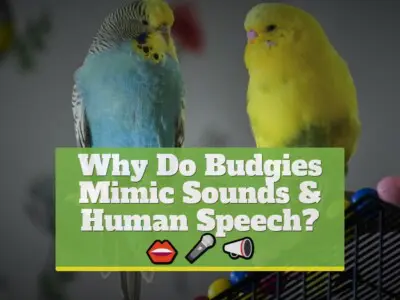Budgies have a vast vocal repertoire. Studies shown that these birds possess distinct vocalizations like contact calls and the warble song, primarily found in males.
Although they may seem similar, their acoustic features are different, signaling unique phonological systems.
This deep dive into their vocal range underscores the importance of understanding their noises – from chirping to whimpering, allowing owners to gauge their mood, health, and even identity, enriching human-budgie interaction.
As a seasoned budgie owner, I’ve come to appreciate the art of deciphering budgie sounds.
From understanding their moods to identifying signs of distress, recognizing these vocal cues can be a game-changer for any budgie parent.
This guide, inspired by personal experiences and in-depth research, is tailored for anyone keen on building a deeper connection with their feathery companions.
Why Understanding These Noises Is Essential for Budgie Owners and Common Budgie Noises
For budgie owners, understanding the various noises their bird makes can be crucial.
These sounds provide insight into the bird’s emotional state, needs, and health.
By recognizing and interpreting these vocalizations, owners can cater to their budgie’s needs more effectively.
Budgies, like other birds, have a wide array of sounds, ranging from happy chirps to signals of distress.
Among these, the chirping noise is common and can have different meanings based on context.
Complexity of Budgie Vocal Repertoire
The budgerigar, scientifically known as Melopsittacus undulatus, has an impressively complex vocal repertoire.
This includes the lengthy warble song of males and various short calls produced by both sexes.
Interestingly, more than 30% of elements in the male’s warble song closely resemble the budgie’s learned contact calls.
But, further study reveals that while they might sound similar, contact calls and elements of the warble song are distinct and convey different information.
Chirping
Meaning and Variations
Chirping is one of the primary vocalizations of budgies. It’s a versatile sound that can convey different messages based on its tone, volume, and context.
- Happy Chirps: These are usually clear, melodious sounds. When a budgie makes these sounds, it’s often a sign they’re content and at ease in their environment.
- Unhappy Chirps: These can be sharper and more shrill. They might indicate discomfort, unease, or a need for something.
- Quiet Chirping vs. Loud Chirping: A soft chirp can mean contentment or relaxation, while a loud chirp can be a call for attention or a reaction to sudden excitement.
- Continuous vs. Intermittent Chirping: A continuous chirp could signal alertness or interest in something. In contrast, intermittent chirps can be seen as casual communication or a sign of relaxed alertness.
Factors Influencing Chirping
Budgies chirp in response to a variety of stimuli and emotions:
- Excitement: New toys, seeing the owner, or other stimulating factors can trigger chirping.
- Communication: Chirping can be a way for budgies to interact with their environment or other birds.
- Boredom: A repetitive, monotonous chirp can be a sign the bird is bored and needs stimulation.
- Stress: Quick, sharp chirps might indicate the bird is stressed or anxious.
- Illness: Changes in chirping patterns or volume can be an early sign of illness.
- Environment (e.g., music, other birds): Budgies often chirp in response to music or the calls of other birds. The sounds in their environment influence their vocal behavior.
Decoding Chirping Contexts
Understanding the context can help decode the meaning behind a budgie’s chirps:
- Chirping when seeing the owner: This is often a sign of recognition and excitement. Your budgie might be greeting you or calling for attention.
- Chirping at night: Budgies are diurnal, meaning they’re active during the day. Chirping at night can be unusual and might indicate disturbance or discomfort.
- Chirping during play or interaction: This shows engagement and happiness. When a budgie chirps while playing, it’s a sign they’re enjoying the activity.
Screeching
Screeching is one of the vocal behaviors exhibited by budgerigars, commonly known as budgies.
By understanding the meaning and variations of screeches, one can better cater to the needs of these feathered friends.
Meaning and Variations
- Alarm Screech: This sound usually signifies that the budgie senses danger or something unfamiliar. It’s like their way of shouting, “Watch out!” It’s a loud, sharp noise that catches the attention immediately.
- Attention-seeking Screech: If your budgie feels left out or wants some of your time, they might let out this screech. Think of it as their way of saying, “Hey, look at me!“
- Playful Screech: Budgies, like kids, can get excited when they play. This screech is more of an expression of joy and fun. It’s their version of laughter!
Factors Influencing Screeching
- Fear: A sudden change in their environment or a potential threat can trigger fear. This is often expressed through an alarm screech.
- Loneliness: Budgies are social creatures. If they feel alone or isolated, they might screech to seek attention.
- Pain or Illness: A budgie in distress or feeling unwell might screech. It’s their way of asking for help.
- Hunger or Thirst: Just like babies cry when they’re hungry, budgies screech when they need food or water.
Handling Screeching Budgies
- Calming techniques: Speak softly or play some gentle music. A calm environment often soothes a distressed budgie.
- Providing distractions: Toys, mirrors, or even a treat can divert their attention and reduce screeching.
- Training: With patience, you can train your budgie to express themselves in less noisy ways.
Squawking Noise
Budgies don’t just screech; they also make squawking noises. Each squawk has its own meaning and understanding them can help improve the bond between you and your budgie.
Meaning and Variations
- Defensive Squawk: This is a warning sound. If a budgie feels threatened, they might use this squawk to say, “Back off!“
- Territorial Squawk: Budgies can be possessive. If another bird gets too close to their favorite spot, they might squawk to claim their space.
- Agitation or Annoyance Squawk: This sound is pretty self-explanatory. If something bothers your budgie, you’ll probably hear this squawk.
- Curiosity Squawk: When exploring something new or unfamiliar, budgies might let out a soft, inquisitive squawk.
Factors Influencing Squawking
- Interaction with other birds (territorial disputes): Just as the study mentioned budgies interacting with canaries and zebra finches, different bird interactions can lead to territorial squawks.
- Disturbance in their environment (unexpected noises, sudden movements): A sudden loud noise or movement can startle a budgie, causing them to squawk.
- Unfamiliar objects or situations: Anything new can pique a budgie’s curiosity, leading to curiosity squawks.
- Feeling threatened or cornered: If a budgie feels trapped or under threat, they might let out defensive squawks.
- Seeking attention: Sometimes, budgies just want some attention and will squawk to get it.
Understanding the nuances of these vocal behaviors can greatly assist in ensuring that budgies are kept in a comfortable, stimulating, and safe environment.
Knowing when they’re scared, playful, or just curious can make all the difference in their care.
Whimpering
Whimpering in birds like budgerigars isn’t the same as in mammals. Still, budgies do produce sounds that might be akin to whimpering.
It is often explored as a budgie cry. Listen the sound:
Meaning and Context
Whimpering-like noises from budgies can be a way they express their feelings.
Understanding when it’s a normal behavior and when it might be a sign of distress is crucial for their caretakers.
When is whimpering normal?
It might be when they are trying to get attention or are slightly annoyed.
Signs of distress
Continuous whimpering or when it’s accompanied by other unusual behaviors.
Reasons Behind Whimpering Noises
Budgies might produce whimpering sounds due to various reasons:
- Illness or Discomfort: Like humans, budgies might vocalize when they are unwell.
- Loneliness: Budgies are social creatures and may whimper when left alone for long periods.
- New Environment: A new cage or a move might make them anxious, leading to such sounds.
Addressing Whimpering
To help a whimpering budgie:
- Comfort techniques: Gentle talking, spending more time with them, or playing soft music can help.
- Vet consultation: If you suspect illness or injury, it’s best to consult with a veterinarian.
Baby Budgie Crying, Whimpering Noise
Budgie crying sound, noise: Young budgies make specific calls, often similar to crying noises, especially when they’re hungry or want attention.
This sound is a way for baby budgies to call for their mother.
Contact Calls vs. Warble Songs
Budgies use a variety of sounds to communicate, and understanding them can be fascinating.
- Contact Calls: These are short calls used by both male and female budgies. They use it to maintain contact with the flock or their partner.
- Warble Songs: These are long, complex sounds primarily made by male budgies. They might use it for attracting a mate or expressing happiness.
While both sounds are forms of communication, they serve different purposes. Contact calls are for basic communication, while warble songs might have more nuanced intentions like courtship.
Study Findings
The study (archived) provides interesting findings on budgie vocalizations.
While over 30% of the warble songs resemble contact calls, they are not the same.
Both these vocalizations are distinctive and are perceived differently by the birds.
Signal analysis revealed that these two types of calls are acoustically different.
It’s not just about inserting contact calls into warble songs. They are unique sounds in the budgie’s vocal repertoire.
This discovery highlights the rich and diverse communication methods of budgies.
Understanding Budgie Behavior through Sounds
Budgies, with their vibrant personalities, have different ways to express themselves. Their sounds are a window into their moods and health.
Happy budgies might sing or warble more. A distressed or sick budgie might become quieter or produce unusual sounds.
Watching a budgie’s posture when it vocalizes can give clues about its feelings.
A relaxed posture with singing indicates happiness, while ruffled feathers and continuous whimpering might indicate distress or illness.
Faqs
How Can I Differentiate Between Happy and Unhappy Chirps?
Budgies have a range of chirps that convey their feelings. Typically, happy chirps are continuous and melodious, while unhappy chirps can be sharp and intermittent.
Observing the body language alongside the chirps can also provide clues. A relaxed posture often signifies contentment.
Do Budgies Chirp More When They Are Alone or with Other Birds?
Budgies are social birds. They tend to chirp more when they’re with other birds.
This is their way of communicating and interacting. When alone, they might chirp to call for companionship or when they hear familiar sounds.
What Is the Differences Between Screeching and Squawking
Screeching and squawking are often used interchangeably when describing bird sounds, especially in a casual context.
However, in the world of avian enthusiasts and experts, there can be distinctions between the two:
- Screeching: This is typically a high-pitched, loud noise. A screech, on the other hand, is longer and might denote distress or fear. Birds might screech for various reasons, such as alarm, discomfort, seeking attention, or indicating some form of distress.
- Squawking: Squawking is generally a harsher, more abrupt noise. It is typically shorter and louder, often indicating annoyance or seeking attention. It can also indicate distress or discomfort, but it might not be as piercing or high-pitched as a screech. Squawking can be a bird’s way of expressing displeasure or annoyance.
Are There Specific Environmental Triggers That Can Cause My Budgie to Screech?
Yes, loud noises, sudden movements, or unfamiliar objects can cause budgies to screech.
These are often responses to potential threats or changes in their environment.
How Can I Recognize If My Budgie’s Whimpering Is Due to a New Environment or Illness?
Whimpering can be a sign of discomfort. If your budgie is introduced to a new environment, it may whimper initially but should adapt with time.
If the whimpering continues or is accompanied by changes in eating or behavior, it could be due to illness.
Consulting a vet would be best in such cases.
Is There a Difference Between a Budgie’s Warble Song and Their Regular Chirping?
Absolutely. The warble song is a long rambling sound mostly produced by males.
Regular chirping, on the other hand, is shorter and produced by both sexes.
Warble songs have more complex patterns than regular chirps.
What Role Do Sounds Play in Budgie-to-Budgie Interactions?
Sounds play a vital role in their interactions. Budgies use sounds for identifying each other, calling for mates, or signaling danger.
For instance, the warble song of a male can be used to woo a female.
Is There a Way to Train My Budgie to Reduce Unwanted Noises?
Yes, with patience and positive reinforcement. Reward your budgie with treats or praises when it’s quiet and ignore unwanted noises.
Over time, it’ll associate being quiet with rewards.
Can Budgies Change Their Sounds as They Age or Due to Experiences?
Yes, budgies can alter their sounds due to age, experiences, or learning.
Just as humans have voice changes, budgies can have subtle differences as they age.
They can also mimic sounds from their environment.
Do Different Budgie Personalities Exhibit Unique Sounds or Patterns?
Each budgie is unique. While there might be commonalities, individual budgies could have distinct sounds or patterns that set them apart, making them identifiable to other budgies and keen-eared humans.
How Should I Respond When My Budgie Squawks Aggressively?
It’s important to remain calm. Avoid making sudden moves or loud sounds.
Give your budgie some time to calm down. Understanding the cause of the squawk can also help in preventing it in the future.
Are Some Budgies More Prone to Squawking than Others?
Just like humans have varied personalities, some budgies might be more vocal or assertive than others.
It’s all a part of their unique character. Observing and understanding their individual personalities can help in better care and interaction.


